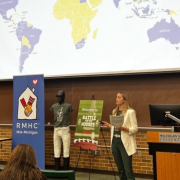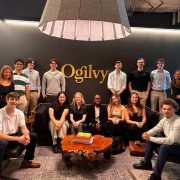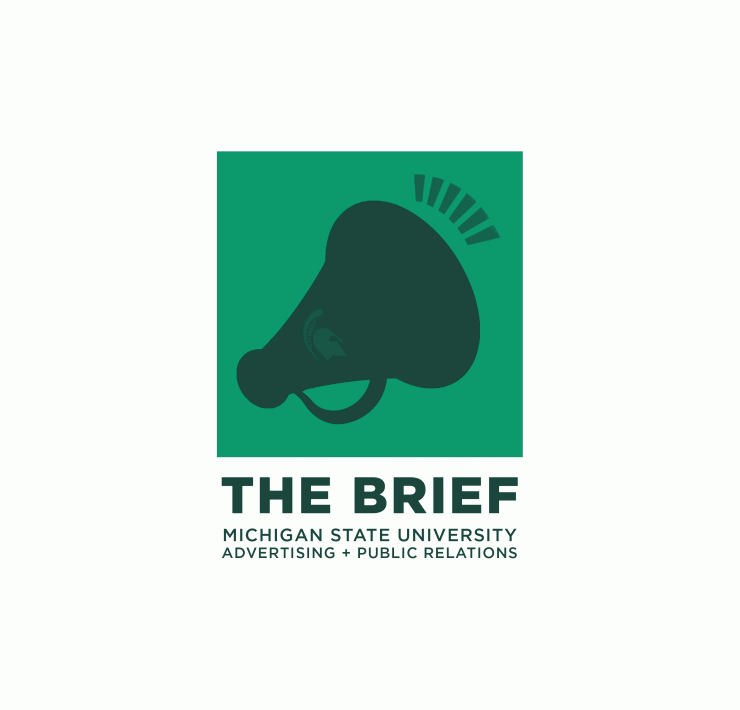Intellectual Curiosity Paves Path for Hairong Li’s Academic Success

By Agnes Bao
Sparty Photo Credit: Michigan State University
Date back to 1990s, Hairong Li, a PhD student in advertising, was working as a part-time student consultant at a Computer Center. At that time, Internet emerged but not many people cared about it.

Li, however, was attracted by one of the earliest web browsers, Mosaic – the browser led the Internet boom. He used, learned and even researched the Mosaic for fun during his part-time job. He never would have imagined that his curiosity about a web browser would led his research career boom in the last 30 years.
Hairong Li is a professor of advertising focusing on digital advertising at Michigan State University (MSU) since 1996, two years after his graduation from MSU with a PhD degree in advertising.
Thinking about the good old days as a PhD student and a part-time student consultant, Li says “at that time, the Internet just emerged and it had nothing to do with advertising,” Li says. “I learned Mosaic just because it was a brand-new thing and I was curious about it.”
“But I also had some feeling that the Internet could be a trend in the future,” he says.
And Li was right.
In 1994 – the year Li graduated from MSU – the first web banner ad emerged, indicating the intersection between the Internet and advertising. It also marked the starting point of Li’s research interest on the Internet advertising.
Due to his foresight and research experience of the Internet advertising, Li got the teaching position at MSU in 1996. “I probably was the first group of researchers who studied the Internet advertising,” Li says.
Since then, his research has closely followed the development of the Internet.
In the last 30 years, Li has developed his research interest from consumer’s television buying behaviors to internet advertising, from e-commerce to mobile advertising, from forced exposure to the intrusiveness of advertising and most recently, he is focusing on the technology of artificial intelligence (AI) in advertising.
“I always enjoy studying new things,” Li says. “The intellectual curiosity is the biggest driver for me.”
Driven by such motivation, Li has published multiple articles that appeared on the Journal of Advertising, which is the top journal in the field of advertising. One of his articles was placed as the leading article at the Journal of Advertising Research special anniversary issue for 50 years.
Besides the field of advertising, Li has expanded his research areas from advertising to marketing and communication. He also has extensive articles that published on top journals in the field of marketing and communication.
In addition to the contribution in academia, Li collaborated with the real-world industry such as Google and Microsoft to help them with research projects.
However, the motivation isn’t everlasting. Li admits sometimes the slow pace of research movement could set him back.
“It might be easy to complete a small-scale research project but it could be much harder to achieve a larger one,” Li says. “It would take longer time, like a year or so, to complete a larger project, or maybe without any progress.”
Most of the projects that Li are interested are large-scale and insightful. He is now focusing on the impact of AI in advertising.
Not everyone has ability to come up with an insightful research idea and carry it out. It needs years of professional experiences and wide vision.
As an international researcher from China, Li is a frequent speaker at academic conference and trade forum in the US and overseas, which provides him with global vision. The most recent conference that Li attended was an international conference on intelligence science and advertising development in Shanghai, China on November 17-18, 2018.
At the conference, Li shared his vision of the latest advances on the use of advertising in AI. Li says, “unlike the past and current ads that are responsive, forced and persuasive, the future ads will be predictive, voluntary and engaging.”
To share best outcomes from the conference, Li with other scholars launched a special section of Artificial Intelligence and Advertising at the Journal of Advertising, which is expected to be published in August 2019.
Li says, “it will be the very first set of articles on such topic for the leading journal of our field.”
This time – just like 30 years ago – Li acts as a leading person in the field of AI in advertising.














